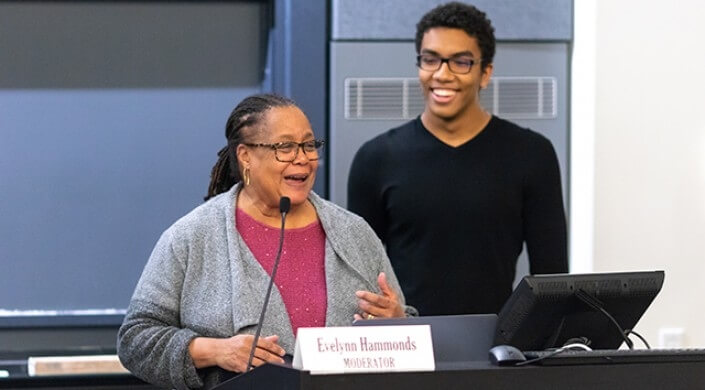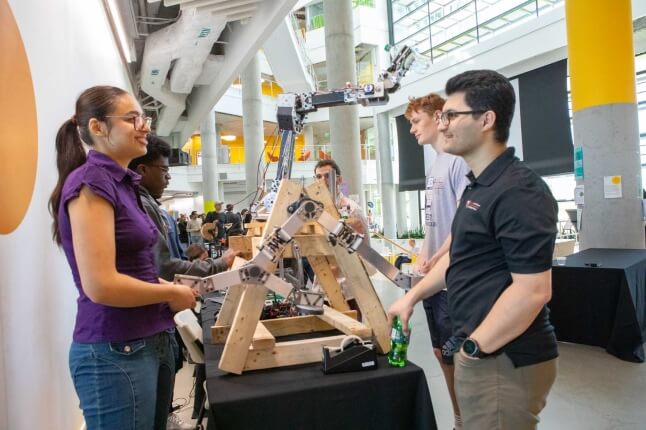News
Professor Evelyn Hammonds, Chair of the Department of the History of Science, and panel organizer Winston Michalak, S.B. '21, an electrical engineering concentrator, welcome students to the Diversity in STEM panel discussion. (Photo by Richard Tong/SEAS Communications)
Science, technology, math, and engineering (STEM) fields often notorious for a lack of diversity, but a Harvard panel discussion on Oct. 18 sought to take steps toward changing that.
The panel, part of the “I’ll Make Me a World: Voices for Diversity in STEM” speaker series, featured Jelani Nelson, John L. Loeb Associate Professor of Engineering and Applied Sciences, and Latanya Sweeney, Professor of Government and Technology, and was moderated by Evelynn Hammonds, Chair of the Department of the History of Science.
The event was sponsored by the Project on Race and Gender Science and Medicine at the Hutchinson Center for African and African American Research in collaboration with the John A. Paulson School of Engineering and Applied Sciences and Department of the History of Science.
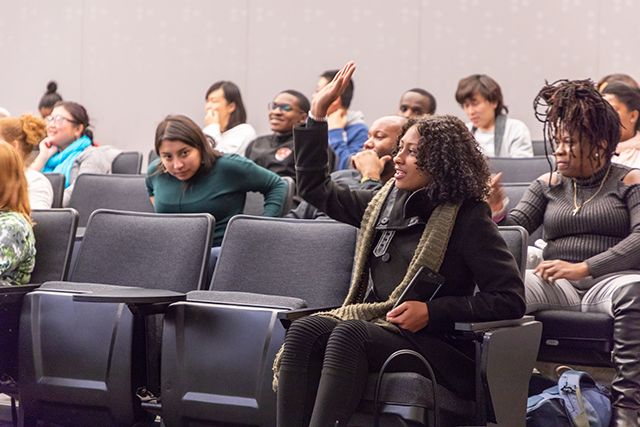
Nia Jones, a Northeastern University senior studying industrial engineering, asks a question. (Photo by Richard Tong/SEAS Communications)
Winston Michalak, A.B. ’21, organized and initiated the panel as a way to address the lack of diversity in computer science and other STEM fields.
“I didn’t think there was enough diversity in STEM, especially at Harvard, and this seemed like the best way of at least making sure that people know that there are black professors and diversity in STEM,” Michalak said.
To an audience of more than 40, Sweeney recounted her experiences as a black, female computer scientist, describing her time as a graduate student at the Massachusetts Institute of Technology.
“I was the first one,” said Sweeney, who was the first African-American woman to earn a Ph.D. in computer science from MIT when she graduated in 2001.
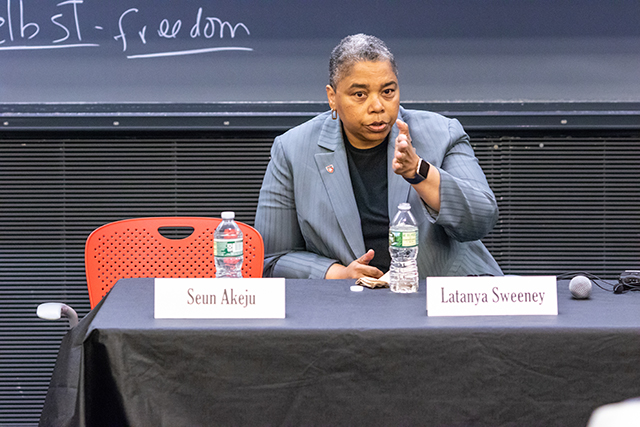
Latanya Sweeney, Professor of Government and Technology, describes her research. (Photo by Richard Tong/SEAS Communications)
For many students, both undergraduate and graduate, just knowing that a black woman has succeeded in computer science is inspiration enough.
“They just need to see me and know that I happened,” Sweeney told the audience, explaining that much of her outreach involves sharing her story and being the role model whose background and experiences are relatable to a more diverse group of students.
“The number of black women in CS has not risen significantly,” said Sweeney, emphasizing that although there has been an improvement in balancing the gender ratio, certain groups are still being neglected.
Nelson, who is from the Virgin Islands but is of Ethiopian descent, described an initiative he launched, AddisCoder, which brings high school students from all around Ethiopia to the capital, Addis Ababa, to participate in a coding bootcamp.
“These students, they don’t know what CS is,” said Nelson. “One student started first grade when he was 13 years old. These are people from all walks of life and we go from how to click, how to use a computer, to things like dynamic programming and memoization.”
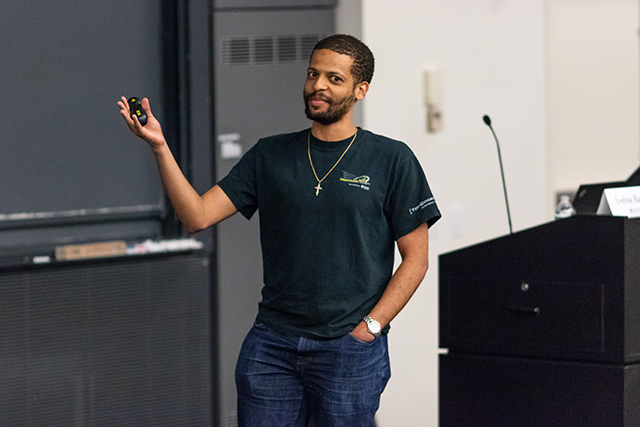
Jelani Nelson, John L. Loeb Associate Professor of Engineering and Applied Sciences, shares how optimism helped him during his academic journey. (Photo by Richard Tong/SEAS Communications)
The first iteration of AddisCoder was in 2011, while Nelson was still a graduate student at MIT. Since then, more than 330 students have participated in the program, with some going on to study at Harvard and MIT.
“No one ever told me I can’t and I just had this optimism,” said Nelson.
That optimism has not only allowed him to get to where he is today, but it also helped him thrive as a student at MIT, where he completed a bachelor’s, master’s, and Ph.D. in computer science. Nelson explained how, as a high schooler, he only applied to MIT because he hadn’t realized how competitive college admissions were, prompting laughter from the audience.
The panel was well-received, with many staying behind to chat with Michalak, Sweeney, and Nelson.
“Being able to see two African-Americans, both really involved in CS, is just amazing because I don’t really get that on a daily basis,” said computer science concentrator Jessica Edwards, A.B. ’21.
“I have a lot of friends who do CS, but I don’t really have a lot of black friends who do CS and it’s like those communities are kind of very separate,” said Edwards, who indicated that the lack of diversity in STEM and computer science is something that she thinks about often as the outreach director for Harvard Women in Computer Science.
“I just really loved the event and these are definitely two professors who I’m really interested in,” Edwards said, before adding that she would “definitely” come to a similar event.
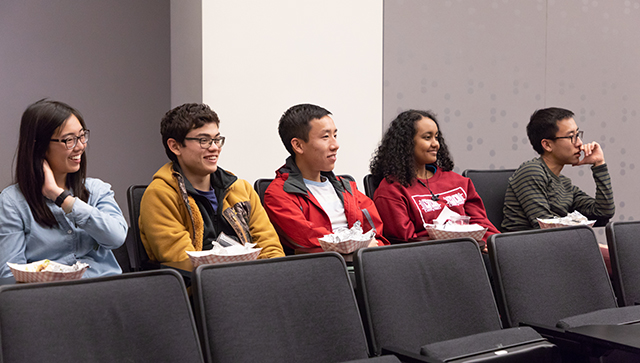
(From left) Anisha Dok, S.B. '20, an electrical engineering concentrator, Alejandro Garcia-Zhang, S.B. '20, a mechanical engineering concentrator, Andrew Yang, S.B. '20, a bioengineering concentrator, Naomi Berhane, A.B. '20, a biomedical engineering concentrator, and Victor Yang A.B. '20, a computer science concentrator laugh at Professor Jelani Nelson’s joke about his video game console collection. (Photo by Richard Tong/SEAS Communications)
Fortunately for Edwards, Michalak has no intention at stopping after one successful event.
“I want to make it a biannual thing and the plan is to expand outside of the Harvard community, to invite people from other institutions or from industry,” he said.
“This has given me an opportunity to learn about diversity in STEM and you get to bring all these people together and they get to share their experiences, their work, their research, and their lives with each other,” said Michalak. “Diversity is super important, it’s essential to everything and it’s especially important now to defend it.”
Bringing people together to focus on the importance of diversity is a primary aim of the speaker series, said Alexis Stokes, Director of Diversity, Inclusion, and Belonging at SEAS.
“It was exciting to see Winston’s vision come to life. . .students, staff, faculty, and postdocs coming together to discuss diversity and inclusion in STEM and celebrate Harvard faculty that are major role models for our community,” said Stokes. “Dr. Hammonds and I look forward to continuing to work with Winston to support the speaker series and other initiatives geared towards increasing students of color and women in STEM.”
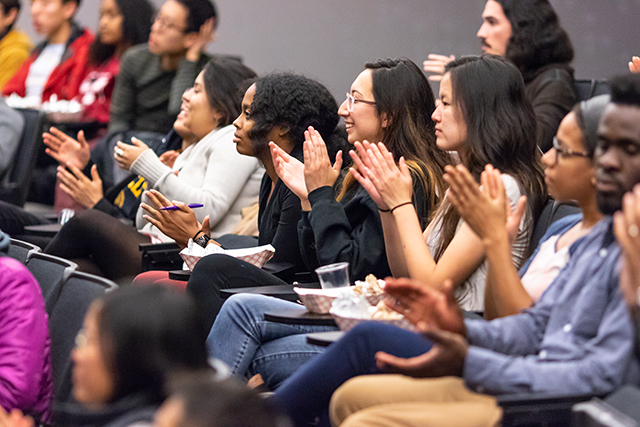
The first panel discussion in the “I’ll Make Me a World: Voices for Diveristy in STEM” speaker series brought together more than 40 students, faculty, and staff to discuss ways to address the lack of diversity in computer science and other STEM fields. (Photo by Richard Tong/SEAS Communications)
Cutting-edge science delivered direct to your inbox.
Join the Harvard SEAS mailing list.
Press Contact
Adam Zewe | 617-496-5878 | azewe@seas.harvard.edu
